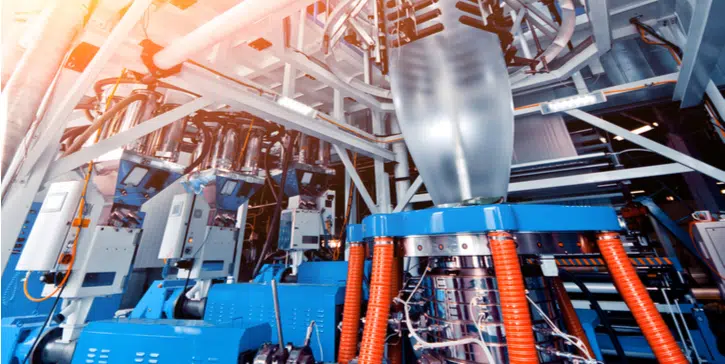Real-time Monitoring and Analysis: Elevating Injection Molding and Making Plastic Mold Maintenance That Much More Effective

Injection molding is a versatile, efficient, and economical method for manufacturing an incredibly wide range of plastic products. It enables production at large scales, which other methods simply can’t. However, the relative size of most injection molding operations brings its own challenges in terms of monitoring, oversight, and planning.
For an injection molding operation to be efficient and effective, manufacturers must have ready access to live data on the cumulative and current output of both the entire operation and individual machines. Ensuring that relevant key performance indicators (KPIs) are selected and monitored is a major undertaking for management and will have serious impacts on production, especially when it comes to mold maintenance.
Why Plastic Mold Maintenance Is Critical to Plastics Manufacturing Operations
The condition of any mold has a significant impact on the quality of the parts it produces. If a mold is in poor enough condition, it will lead to manufacturing defects that exceed tolerances and will require corrective processing or scrapping the part. In either case, this leads to materials, time, and money wasted.
The wide variety of issues that molds regularly develop require effective mold maintenance procedures to overcome. Without both an effective mold maintenance schedule and procedures to account for regular and irregular issues, any manufacturing environment will be producing an unacceptable level of product defects.
Through regular wear and tear in the high-temperature conditions under which molds operate, they’re likely to develop some specific issues that affect part quality. Among the most common are rust or material residue stuck on the mold surface, affecting parts. Damage to the mold, such as cracks, will also result in production defects.
Mold maintenance isn’t purely concerned with product quality but also with the longevity of individual molds. When they aren’t properly maintained, molds are likely to undergo premature mold failure. This increases that overall costs, either due to excessive repairs or early replacement.
In the worst-case scenario, premature mold failure can lead to further damage to machines. The cost to repair damaged machines will be significantly higher than mold replacement costs and are a key reason why both mold and injection molding machine maintenance plans are so essential to any operation’s bottom line.
The Challenges of Optimizing Mold Maintenance Schedules
Plastic mold maintenance plans are generally scheduled based on the number of injections. The mold supplier will have some recommendations, but that isn’t necessarily the number that manufacturers will use. Over the years, many will develop their own schedules based on experience and intuition, but this doesn’t always produce the best results.
In fact, there is a tendency to neglect important injection molding tool maintenance due to the inherent trade-off that it presents. Maintenance requires downtime, and that’s time that parts aren’t being produced and KPIs are going down. While this might appear to be the case at a glance, neglecting maintenance can have far more adverse effects on production in the long run.
In order to truly understand the relationship between maintenance and KPIs, managers need effective tools for capturing and analyzing this information. In doing so, they’re able to make adjustments and optimize their maintenance schedules not based on intuition but on real production data. In the end, this approach enables manufacturers to get the most out of their injection molds.
How KPIs and Maintenance Can Affect Each Other
Gaining insight into KPIs in real-time and across cycles can give manufacturers the feedback necessary to develop better planned and reactive mold maintenance procedures. Analyzing product quality, KPIs can indicate mold condition. An increase in defects over time can show the ongoing deterioration of mold quality and demonstrate the need for maintenance.
These kinds of valuable insights are only possible with a real solution for ongoing performance monitoring. Traditionally manufacturing environments have only had access to essential data after the fact with only very limited resources for aggregation and analysis. Today, digitalization on the factory floor provides a much more effective means for real-time performance tracking and effective analysis.
Product quality and mold maintenance are linked in ways that only become apparent and actionable when organizations have the ability to aggregate KPIs and correctly analyze within the proper context. This allows manufacturers to develop the optimal balance between the three primary areas of concern for mold maintenance.
- Maintaining High Performance. Molds are going to perform at the highest level immediately following their scheduled maintenance. Without any rust or material contamination, part defects are kept to an absolute minimum. The performance will decline with continued injections. The challenge that organizations must solve with reliable data is determining the ongoing rate of decline and how to optimize the maintenance schedule.
- Extending Mold Life. Mold life is going to play a significant role in the overall cost of ownership for injection molding machines. Being able to accurately track and plan maintenance is essential to ensuring that molds last as long as possible. Without the ability to accurately carry out the maintenance schedule, molds can undergo accelerated wear and require replacing significantly sooner than expected.
- Balancing Quality and Cost. Upholding quality is essential to any manufacturing operation. However, there is a point where quality must balance with increasing costs. Additional maintenance might improve quality, but the program eventually has diminishing returns. Having data in the proper context makes it possible to analyze and understand this balance.
These factors all play into each other in complex ways that aren’t always intuitive. The only way to make effective decisions is to have access to data analysis when and where it’s needed.

Changing the way people work in factories
Request a DemoDelivering the Analysis Your Organization Needs for Better Mold Maintenance
The key to applying these principles and developing the most effective mold maintenance schedule and procedures is having effective plastics production monitoring. Matics provides real-time production monitoring that enables injection molding operations to aggregate and analyze the KPIs they need to optimize their maintenance for the best possible results.
Matics Real-time Operational Intelligence (RtOI) gives manufacturers comprehensive tools for monitoring and managing their operations. This includes the ability to manage molds in an intuitive and effective manner, with consolidated access to maintenance planning and performance data. Not only does the solution provide easy access to this data, but it also provides alerts essential to maintaining quality.
Matics RtOI works with existing systems to aggregate and analyze data, providing operations and management with access to essential information within a single platform. Analysis within the platform lets manufacturers develop and optimize their own maintenance schedules, refining mold supplier guidelines to suit their own unique process and production environment.
The most effective aspect of Matics’ solution for plastics production is that this data and analysis is available in real-time. It puts operators and managers into the most effective position for overseeing operations, reacting to changes in KPIs and other metrics, and making changes to processes based on reliable data.
Matics RtOI could be the solution that your plastics manufacturing operation needs to improve KPIs and implement more effective plastic mold maintenance. The platform serves to increase data availability and analysis at every level of production and makes scheduling, planning, and executing maintenance more straightforward.
With the oversight and alerts that the platform provides, managers can be sure that maintenance is being carried out as planned. You can book a demo to find out what Matics can do for your organization by contacting our team today.




